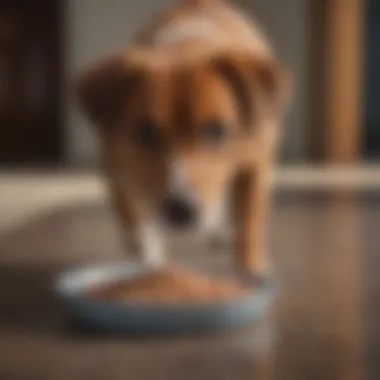Choosing the Best Dog Food for Loose Stools


Intro
Selecting the right dog food for pets experiencing digestive issues, specifically loose stools, requires a careful approach. The choices available in the market can be overwhelming. However, understanding the specific nutritional needs of your dog can simplify this process. This guide focuses on key aspects that determine the effectiveness of a diet in managing gastrointestinal health.
Understanding Your Pet
Understanding your pet is foundational to choosing the right diet. Not all dogs are the same. They vary by breed, temperament, and individual needs. Each of these factors can influence their digestive health and response to food.
Breed Traits
Certain breeds have unique digestive systems. For instance, small breeds may be more prone to sensitivities than larger ones. It's essential to be aware of these traits when selecting food.
Common Temperaments
The temperament of your dog can also play a role in its digestion. An anxious dog might experience more stress-related digestive issues. Recognizing how your pet's personality affects its health can guide you towards suitable food options that promote calmness.
Special Needs
Some dogs may have specific health concerns that necessitate a specialized diet. For example, pets with food allergies or sensitivities require formulas that avoid common irritants. Consulting a veterinarian for tailored advice is crucial when addressing particular health needs.
Pet Care Essentials
Proper pet care encompasses multiple factors, with nutrition being paramount in managing loose stools. Here, we delve into the basics of feeding and general care.
Nutrition and Feeding Guidelines
A balanced diet is essential for a dog's overall health. Consider food made with high-quality proteins and soluble fibers that ease digestion. Look for ingredients such as rice or pumpkin, which can provide gentle support to your dog's digestive system. Remember to introduce new food gradually to avoid further gastrointestinal upset.
Grooming Tips and Techniques
Grooming maintains your dog's general well-being. Regular brushing reduces allergens and promotes a healthy coat. While grooming may not directly impact digestion, it contributes to your dog's overall health and comfort.
Health and Wellness
Beyond food, regular vet check-ups are vital. Monitoring weight and digestive health can help catch issues early. Keep an eye on the stool consistency and any additional symptoms that may arise.
Training and Behavior
A well-trained dog is often a more relaxed one. Basic commands and training can help manage anxiety, which may contribute to digestive problems.
Basic Training Techniques
Training should be consistent and positive. Use short sessions to reinforce learning. This can alleviate behavioral issues that might influence digestion, offering a calmer environment.
Behavioral Problems and Solutions
Recognizing signs of stress is crucial. If your dog displays anxiety or aggression, consider strategies to moderate these behaviors. Behavioral modifications can lead to improved digestive health.
Mental Stimulation Activities
Engage your pet with toys or puzzles. Mental exercise can divert from anxiety-driven behaviors. Enhanced mental well-being often translates to improved physical health, including digestion.
Engaging with Your Pet
Strong engagement with your pet is essential for bonding and their well-being.
Interactive Games and Toys
Choose toys that encourage activity. Interactive play can soothe stress and promote a healthier digestive process.


Safe Outdoor Activities
Regular walks not only provide physical exercise but also mental stimulation. Being outdoors can reduce stress for many dogs, potentially aiding their digestion.
Family-Friendly Pet Interactions
Encouraging positive interactions within the family can help mitigate stress for the dog. Familiarity with family members can create a supportive environment, aiding better digestion.
Pet Adoption and Integration
If adopting a new pet, understanding the integration process can help. Transition can impact a dog's digestive health.
Choosing the Right Pet for Your Lifestyle
Select a breed that aligns with your daily routine and living conditions. This ensures the pet's health needs, including dietary requirements, are manageable.
Preparing Your Home for a New Pet
Create a safe and welcoming space for the new pet. A stress-free environment aids in a smoother adjustment, contributing to digestive health.
Tips for Smooth Preface
If introducing a new pet to existing animals, gradual introductions are crucial. Monitor interactions in a controlled manner to reduce stress responses, which can otherwise lead to digestive issues.
The quality and balance of dog food significantly influences the dog's digestive health. Always prioritize ingredient quality over marketing claims.
As you continue reading this article, you'll gain more insights into how to select the right food for your dog experiencing loose stools, ensuring a healthier life for your furry companion.
Understanding Loose Stools in Dogs
Understanding why dogs experience loose stools is vital for pet owners. Loose stools can be a sign of various underlying issues that may impact a dog's overall health. Recognizing the causes and effects not only aids in immediate health management but also assists in long-term dietary adjustments. Addressing loose stools promptly can prevent more severe complications.
Defining Loose Stools
Loose stools, or diarrhea, refer to unusually watery and unformed feces in dogs. This can vary from mild soft stools to more severe liquid waste. Monitoring stool consistency can be an essential part of maintaining your dog's health. Loose stools can be intermittent, or they can present as a more chronic condition. In any case, observing changes in your dog's gastrointestinal health is critical.
Common Causes of Loose Stools
Loose stools can result from several factors related to a dog's diet, environment, and health status. Here are some common causes that pet owners should be aware of:
Dietary Indiscretion
Dietary indiscretion occurs when dogs eat inappropriate or spoiled food. This can include garbage or human food that is not suitable for dogs. The key characteristic of dietary indiscretion is unpredictability in what a dog might consume outside of their regular diet. It is a frequent contributor to digestive issues and is particularly noteworthy in this article as it highlights the importance of monitoring what your pet ingests. Although dogs are often curious and may eat something they shouldn't, this behavior can lead to uncomfortable gastrointestinal disturbances.
Food Allergies or Sensitivities
Food allergies or sensitivities arise when a dog reacts negatively to specific ingredients in their diet. This problem can present in various ways, including loose stools. The defining feature of this condition is that it often arises from specific protein sources, grains, or additives found in commercial dog foods. For this article, understanding food allergies is essential since identifying the problematic ingredient can lead to more effective dietary choices that promote better gut health.
Gastrointestinal Infections
Gastrointestinal infections are often caused by bacteria or viruses that invade a dog’s system. These infections can lead to severe diarrhea and other symptoms. The primary concern is the impact that such infections can have on a dog's digestive health and hydration levels. Recognizing the signs of an infection is crucial for early intervention and treatment. This information is notably beneficial, as it guides pet owners on the seriousness of some cases of loose stools and the need for medical attention.
Parasite Infestation
Parasite infestation includes various worms and other organisms that can inhabit a dog's intestines. These parasites can disrupt the normal digestive process, leading to loose stools. A unique feature of this cause is that it may be accompanied by weight loss or lack of appetite. Highlighting parasites in this article raises awareness among pet owners that these infestations are more common than one might think and can often go unnoticed until serious digestive issues arise.
When to Consult a Veterinarian
It is essential to know when loose stools indicate a deeper issue that requires veterinary attention. If dog owners notice prolonged diarrhea, blood in stools, or severe lethargy, they should seek professional help. Early intervention can significantly enhance recovery outcomes and prevent potential complications.


Nutritional Needs for Dogs with Digestive Issues
Understanding the nutritional needs for dogs facing digestive issues is crucial. It directly affects their well-being and can alleviate symptoms like loose stools. The right nutrients help restore digestive balance and ensure overall health. When choosing dog food, specific elements must be fitted into the dog's diet.
The Role of Fiber in a Dog's Diet
Fiber has a significant role in a dog's digestive health. It helps regulate bowel movements and can improve stool consistency. There are two main types of fiber: soluble and insoluble. Soluble fiber absorbs water, forming a gel-like substance that can help in softening stools. Meanwhile, insoluble fiber adds bulk to the stool and aids in transit through the digestive tract. Sources like pumpkin, sweet potatoes, and oats provide beneficial fiber. For dogs with loose stools, it's best to include moderate amounts of fiber to facilitate better digestion.
Protein Quality and Its Impact
The quality of protein in dog food contributes greatly to digestion. Different protein sources have varying digestibility. High-quality proteins, like chicken, turkey, or fish, are easier for dogs to digest than lower-quality by-products. When selecting dog food, look for specific protein sources, ideally named meats, rather than generic terms. Adequate protein supports muscle maintenance and overall health, which can be especially important for dogs dealing with digestive concerns. Ensuring a dog gets sufficient, good-quality protein can help in stabilizing their health.
Importance of Probiotics and Prebiotics
Probiotics and prebiotics play essential roles in maintaining gut health. Probiotics are live bacteria that provide health benefits when consumed in adequate amounts. They can help restore the natural balance of gut flora, which may be disrupted due to loose stools. In contrast, prebiotics serve as food for these beneficial bacteria. Ingredients like chicory root and beet pulp are good sources of prebiotics. Including these in a dog's diet can enhance digestion, improving overall gut function and health.
Hydration Needs During Digestive Distress
When a dog experiences loose stools, hydration is critical. Diarrhea can lead to dehydration, so ensuring a dog has access to plenty of fresh water is vital. Sometimes, electrolytes may also need to be replenished. In acute situations, a vet may suggest a bland diet or special fluids to rehydrate effectively. Keeping an eye on a dog’s water intake during digestive distress can prevent complications related to dehydration.
Identifying Good Dog Food Options for Loose Stools
The selection of appropriate food significantly impacts a dog’s overall health. For those experiencing loose stools, choosing the right dog food can enhance their well-being markedly. Appropriate food options not only help to manage digestive issues but also support overall nutrition. When identifying good dog food, dog owners must focus on key ingredients, avoid harmful additives, and consider reputable brands.
Key Ingredients to Look For
When evaluating dog food for pets with loose stools, certain ingredients play a more pivotal role. Understanding these ingredients can guide owners to make informed choices.
Digestible Carbohydrates
Digestible carbohydrates are essential to a dog’s diet, especially when addressing gastrointestinal issues. They provide readily available energy without overwhelming the digestive system. Their key characteristic is that they break down easily and reduce bowel irritation. Choosing dog food with uquality digestible carbohydrates, like rice and sweet potatoes, is beneficial. The unique feature of these carbohydrates is their gentleness on the intestines, leading to a more balanced stool consistency. However, over reliance on certain carbs might lead to weight gain long-term if not monitored carefully.
Lean Proteins
Lean proteins are also important for dogs facing digestive challenges. They contribute to muscle maintenance and repair while being easier to digest than fatty alternatives. Their primary characteristic is a lower fat content, making them a popular choice for sensitive stomachs. Sources like chicken, turkey, and fish provide high-quality protein which aids healing. The unique aspect of lean proteins comes from their nutrient density, as less fat means more protein per serving. However, it is crucial not to ignore variations in protein quality across brands, as some additives might hinder benefits.
High-Quality Fats
High-quality fats support energy needs, particularly for active dogs. A key characteristic of these fats includes omega-3 and omega-6 fatty acids, which promote healthy skin and coat as well as aid in digestion. Opting for fats from natural sources, such as fish oil or flaxseed, is crucial in dog food formulation. These fats enhance nutrient absorption which can improve stool quality over time. Yet, it’s advisable to monitor total fat intake since excessive fat can exacerbate digestive issues.
Ingredients to Avoid
Understanding what to exclude is as important as knowing what to include. Certain ingredients can worsen conditions like loose stools.
Artificial Additives
Artificial additives are often used in dog food to enhance flavor and appearance. However, they can lead to allergies and digestive distress. Their key characteristic is that they offer little nutritional value while potentially causing side effects. Ingredients like artificial colors and flavors should be actively avoided. Their persistent use could lead to long-term health issues for dogs with sensitive digestive systems, such as increased gastrointestinal upset.
Fillers and By-products
Fillers and by-products serve as low-cost components in many dog foods. Common fillers include corn and soy, which often lack sufficient nutrient value. Their main characteristic is that they bulk up the food without providing essential nutrients. For dogs struggling with loose stools, such ingredients can aggravate the situation. Avoiding these components is crucial in selecting the best food. The potential disadvantage of using fillers is the risk of undernourished pets over time, raising concerns about their overall health and energy levels.
Recommended Brands and Formulations
When searching for good dog food for loose stools, it is essential to choose reputable brands known for quality. Some brands stand out due to their commitment to using high-quality ingredients in their formulations. Brands like Hill's Science Diet, Royal Canin, and Purina Pro Plan offer specialized options aimed at digestive health. Many of these products contain the right combination of nutrients designed to strengthen gastrointestinal function. Selecting a formulation that targets the specific needs of the dog will improve digestive health and, as a result, manage the loose stools effectively.
By focusing on these aspects, pet owners can select dog food that supports their pet's health and well-being.
Transitioning to New Dog Food


When you face the challenge of selecting the right dog food for your pet with loose stools, transitioning to new food becomes a crucial aspect. A proper transition helps ensure that your dog can adjust to the new diet gradually, minimizing gastrointestinal distress. Quick changes can upset the digestive system, leading to further issues. Thus, a thoughtful approach can ensure better digestion and absorption of the nutrients which the new food offers.
Gradual Transition Techniques
Gradual transitioning is key to a successful dietary change. It is generally recommended to introduce the new dog food slowly over a period of about seven to ten days. This method helps to avoid an overwhelming reaction from your pet's stomach and can make the experience smoother.
- Start with a Mix: For the first few days, mix a small amount of the new food with the dog's current food. A ratio of around 25% new food to 75% old food is a good starting point.
- Observe Reactions: Keep a watchful eye on your dog’s reaction. Note any changes in stool consistency and overall behavior. Should there be signs of distress or continued loose stools, you may need to slow down the transition.
- Increase Proportions Gradually: Over the next few days, gradually increase the proportions of the new food while decreasing the old food. About every few days, modify the mix to 50% new food and 50% old food, then 75% new food to 25% old food until you reach 100% new food.
- Consider Digestive Aids: Sometimes, adding a digestive aid, such as plain pumpkin, can help ease the transition. Pumpkin adds fiber and can help firm up stools during this period.
Monitoring Dietary Changes
Monitoring dietary changes is essential to evaluate how your dog adapts to the new food. Every dog is unique, and their responses can vary. Consistent observation can help you identify if the new food positively impacts their digestive health.
- Keep a Log: Maintain a journal to record your dog’s stool quality, overall health, and energy levels. Documenting these changes provides insight into the effectiveness of the new diet.
- Watch for Red Flags: If loose stools persist beyond the initial transition period, or if your dog shows signs of discomfort such as bloating or lethargy, it may be wise to consult a veterinarian. This could indicate a more serious underlying issue or that the new food isn’t suitable for your pet.
- Regular Check-ups: Schedule regular veterinary check-ups to ensure that your dog's nutrition is well balanced. These appointments can be helpful for addressing any concerns and adjusting the diet when necessary.
Additional Considerations for Dog Owners
When it comes to addressing loose stools in dogs, choosing the right dog food is crucial, but it is not the only factor that pet owners should consider. Several other elements play an important role in the overall health and well-being of dogs. Understanding these nuances can help pet owners provide a comprehensive approach to managing their dog’s digestive health.
The Role of Regular Vet Check-ups
Regular veterinary check-ups are essential in maintaining the health of any dog, especially those with ongoing digestive issues. These appointments allow the veterinarian to assess your dog's health condition and identify any underlying problems that may contribute to loose stools.
During a routine visit, the vet can conduct fecal tests to look for parasites or infections that may not be immediately apparent. They can also evaluate the dog's weight, hydration status, and overall vitality. Treatment plans can then be adjusted based on current health conditions and dietary needs.
Moreover, veterinarians can provide tailored recommendations for dog food options. This advice can be based on your dog's specific health profile, which includes any allergies or sensitivities that may not have been identified previously. Regular check-ups keep the lines of communication open between pet owners and veterinarians, fostering an environment where issues can be addressed promptly.
The Importance of Stress Management
Stress can significantly impact a dog's digestive health. Dogs are creatures of habit and can react negatively to changes in their environment. Factors such as moving to a new home, changes in family dynamics, or the presence of new animals can lead to gastrointestinal distress.
Monitoring your dog's stress levels is key. Reducing stress can involve creating a stable routine, providing a safe space for the dog, and ensuring social interactions are positive. Healthy exercise routines also help alleviate excess energy and reduce anxiety. Consider incorporating relaxing activities like gentle walks or quiet time together.
In summary, managing your dog’s stress is a pivotal part of maintaining digestive health, which can positively influence the condition of loose stools.
Behavioral Factors Influencing Digestion
A dog's behavior can greatly influence its digestion. A nervous or anxious dog may eat too quickly, which can lead to gastrointestinal upset. It is important for pet owners to observe how their dogs interact with food and their environment.
Encouraging slow eating can be beneficial. Using special slow feeders or food puzzles can help dogs take their time. This approach reduces the likelihood of ingesting air, which can cause bloating and discomfort.
In addition, establishing a calm eating environment can further promote better digestion. Consider minimizing distractions around your dog during mealtimes, providing them with a quiet space to eat. Recognizing behavioral habits that may impact digestion allows pet owners to make small adjustments that lead to significant improvements in gastrointestinal health.
Important Note: Always observe how your dog reacts during and after eating. Behavior shifts can be an early indication of dietary issues.
By taking these additional considerations into account, dog owners can create a supportive and healthy environment that complements the nutritional needs associated with loose stools, leading to improved overall well-being.
Culmination
In summary, understanding the proper nutritional needs of dogs facing digestive issues such as loose stools is key to enhancing their overall health. This article has examined vital factors, including common causes of loose stools, the role of quality nutrition, and practical strategies for selecting the right dog food. Pet owners should recognize that quick fixes often do not address the underlying problem. Instead, investing time and effort into choosing appropriate food can contribute to long-term well-being.
Recap of Essential Points
It is important to revisit the main takeaways regarding dog nutrition for digestive issues. Some essential points include:
- Recognizing Symptoms: Being able to identify loose stools is critical. Watch for changes in your dog’s stool consistency.
- Common Causes: Identifying triggers such as food allergies, dietary indiscretion, or infections can help address the issue effectively.
- Nutritional Solutions: Look for ingredients that promote digestive health, such as digestible carbohydrates and high-quality proteins. Avoid fillers and artificial additives that may worsen the condition.
- Gradual Transition: When changing your dog’s food, ensure a gradual transition to prevent further gastrointestinal distress.
- Regular Monitoring: Keep track of your dog's response to new food and consult your veterinarian if loose stools persist.
Understanding these aspects can empower dog owners to make informed decisions about their pets' nutrition and health management.
Final Thoughts on Dog Nutrition
The journey towards finding the right dog food for loose stools requires diligence and knowledge. Nutrition is not just about filling a bowl; it is about optimizing health and enhancing quality of life. Proper dog nutrition plays a significant role in managing dietary issues while supporting overall health. It is crucial to prioritize high-quality ingredients and consider individual dietary needs, especially for dogs that often experience gastrointestinal distress.
Always consult with your veterinarian when making significant changes to your dog’s diet, as they can provide personalized recommendations based on your dog's specific health requirements. By investing in quality nutrition, pet owners are contributing to a happier and healthier life for their furry companions.
“The food you choose for your dog is as important as the one you choose for yourself.”



